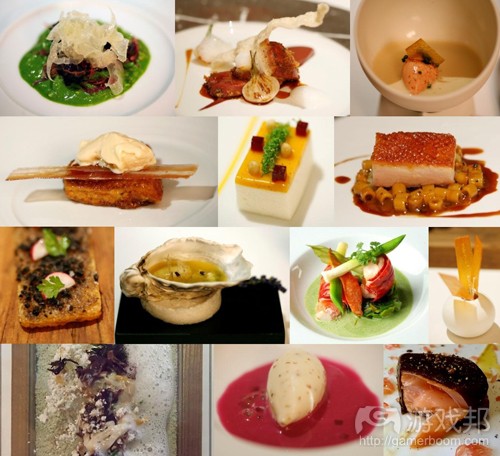Brenda Romero称游戏设计师应向厨师学习
作者:Alex Wawro
Brenda Romero一直致力于研究掌握游戏设计的意义。
她在15岁的时候就已经投入游戏行业,现在已将她大部分时间用于训练、传授以及演讲关于游戏制作的艺术,这也许一点也不令人意外。令人意外的是我今年初通过Skype和她交谈时,我们的话题居然会突然切换到美食领域。
Romero表示,“我曾在米其林三星餐厅吃饭,当我走进去时,就深为其完整的设计感所惊叹,这就好像进入一款电子游戏。”
据她所言,进入该餐厅的感受就像是载入《毁灭战士》这类游戏的第一个关卡。该餐厅的一切设计——从熨得一丝不苟的桌布,到为食客提供放置包包的地方,无一不是人性化设计师的精心选择。
“我在观察米其林大厅(非常对应进入社交游戏时的感觉)时发现,Gordon Ramsay尤其像是一名主游戏设计师,他的厨房中充满这类人,如果最终产品出错了那就是他的责任。他有责任确保每种食材都尽善尽美。”
Romero花了大量时间思考美食。大约三年前,据她估计,她有三年时间阅读了关于米其林星级大厨的事迹,并与他们交谈,消费他们的作品。这其中的意义并不仅局限于美食,Romero声称大厨和游戏设计师之前的相似性令人惊讶,这两个领域的设计师都可以相互学习。虽然二者的媒介不同,但设计过程和原理却很相似——只是其中一者是在餐厅空间的局限性中创作,一者是在游戏的局限性中创作。
Romero声称自己最初对米其林星级大厨所做的排骨并不感兴趣——与多数人一样,她只是为了“好吃的美食”而来,但她马上开始发现游戏开发者也可以从精英大厨管理厨房的方式中借鉴经验。
她告诉我,“他们的工作和我们的工作有巨大的相似性。都是关于人和材料——即你在游戏中投入的东西。它的主旨就在于尽量创造真正优质的作品。”
“在游戏行业,我们通常是被迫从烤炉中拿出一些东西,并在它完工之前发送出去。也许我们应该调整一下自己的食谱了。”
游戏设计可借鉴的烹饪经验
Romero是一位游戏行业元老。她出道时是QA身份,后来成为知名设计师,之后又与人联合成立了一家工作室,并在在UC Santa Cruz教授游戏设计课程。她的作品包括《Wizardr》这种传统的PC RPG,以及Facebook游戏和实体游戏,所以听到她说基于自己从专业烹饪文化所学到的经验来改变游戏设计方法,这一点颇令我意外。
当我问道游戏开发者如何向烹饪厨师学习时,她答道“厨师比我们更不惧怕尝试。我们游戏行业太拘泥于‘题材’了,当你选择这些食材时你就只能制作出已经存在的内容。我们应该学习厨师不怕失败的尝试精神。”
当然,独立游戏开发者Rami Ismail最近指出,行业中的失败结果各不相同。小型独立工作室在设计过程中尝试创新的举动颇为常见,因为他们输得起,就算是失败了也不过是影响了几个人的生计问题而已。而如果大型开发商失败了,就有可能造成3000名员工无法按时还房贷。
所以我问Romero关于厨师烹饪经验是否适用于大型工作室时,她承认在大型工作室中尝试一种游戏设计并企图颠覆一种传统题材的界限,远比独立开发者或小型团队更困难。
“如果你在某个项目上投入上百万美元,你就得最小化自己的风险。这很符合经商之道。我确实认为我们将看到来自小型团队的一些最佳游戏创新现象。这一点不难理解,并且它不会比大型团队的创新更渺小。”
但即使大型工作室中的人无法像小型团队的同行一样承担风险,Romero也认为他们仍可从优秀的烹饪厨师那里借鉴一些经验。
“我认为人人都可以追求卓越。在这些餐厅中,有些工作分工极为明确——你只做特定的任务,并且让自己的表现臻于完美。我不认为100人的团队就无法像4人团队一样发挥这种卓越性。”
“但有一点是肯定的,协调大型团队成员之间的工作难度要超过小型团队。”
而这正是团队领导的职责。在小型团队中则由创意总监来负责,其他团队可能是由设计主管或制作人或工作室创始人来监管。无论是谁,厨房里面总得有个主厨。
Romero称“无论项目领导是谁,大厨的责任就是管理好整个团队。你不能因自己的失职而怪罪某人做出了次品。你才是关键,大厨应确保呈现在食客面前的一切东西都是最好的。这是他们的职责所在。”
最后,设计师就好比是大厨——必须确保他们的工具足够锐利,他们有最高品质的食材。“重要的是使用你所能负担的最佳计算机,最好的人才,最棒的工具。你不可能用垃圾食材制作出绝世美味。”
一生的投入
这些食材之一就是时间,Romero称设计师和大厨都要在精通自己的手艺之前投入足够的时间。
我和Romero的这番对话始于我想了解更多关于她将在GDC 2014演讲的主题内容 Jiro Dreams of Game Design(灵感来源是2011年记录片《Jiro Dreams of Sushi》)。该记录片中的寿司大厨Jiro Ono一生都致力于精通自己的手艺,Romero称她看完该记录片后对Ono有一种特别的亲近感。
她表示,“我觉得我对自己的专业就像Jiro一样投入。他在拍摄记录片时已经85高龄了,但仍然不觉得自己已经学到尽头了。该记录片是向那些投身于某一事业的人致敬,它是一种呼唤。我想还有许多游戏开发者也会感同身受。”
Romero就是其中之一,“如果我不开发自己的游戏,我就会觉得浑身不自在。如果我投入其中的时间不够长,我就会开始生气。我必须这么做,我就是这么一个人。”
我告诉Romero,我并不认为每位开发者都要有这么强烈的敬业态度。她承认自己一生中很大一部分时间是被游戏热情所占据——他的丈夫是游戏设计师,朋友是游戏设计师,她每天要在游戏中投入16小时。这些工作与主厨具有明显的相似性,后者通常要在餐厅投入12-16小时准备菜单,寻找食材,以及领导团队成员。
那么那些不在工作时喜欢花更多时间陪伴好友和家人的设计师呢?沉迷于游戏设计艺术的设计师就一定要被为一名手艺大师吗?
Romero对此的回答是,“对Jiro来说,制作寿司就是他的生命,也是他的快乐来源,就好像制作游戏会让我快乐一样。我并不想为每天工作16小时而道歉。我知道并不是人人都有必要这么做,也并不是人人都能如此投入。但我就是这样,我要不断思考游戏和设计。”
她并非唯一如此投入之人。Romero声称自己遇到的许多设计师,自己班上的一些学生对游戏及其设计的热情也不亚于任何米其林星级大厨。
“对我来说,看到这部记录片,并研究这些大厨对事业的投入让我很有感悟。你可以尽己所能进行尝试。”
“当然,我还没有资格说卓越。我是在说其他人的卓越表现,以及我们可以从中借鉴的精神,并不是我个人的卓越性,因为我想自己还有很大的提升空间。”(本文为游戏邦/gamerboom.com编译,拒绝任何不保留版权的转载,如需转载请联系:游戏邦)
Brenda Romero: What game designers can learn from Michelin chefs Exclusive
By Alex Wawro
Brenda Romero has spent a lot of time thinking about what it means to master game design.
Given that she’s been working in the game industry since she was 15 and now spends the lion’s share of her time practicing, teaching, and speaking about the art of game making, this is perhaps not terribly surprising. What is surprising is how quickly our conversation turned to food when I spoke with her via Skype earlier this year.
“I was at dinner at a Michelin 3-star, and when I walked in I was surprised by how much it felt so much like a completely designed experience, just like entering a video game,” says Romero.
To hear her tell it, the experience of walking into that space feels just like loading into the first level of a game like DOOM. Everything about the restaurant’s design — from the way the tablecloths are ironed to the thought that goes into providing a convenient, unobtrusive place for customers to place their bags — evinces the conscious choice of a human designer.
“I realized, while watching Hell’s Kitchen — which is an especially fitting comparison if you’re working in social games — that Gordon Ramsay is exactly like a lead game designer,” Romero tells me. “He has all these people in his kitchen, and if anything goes wrong it’s his name on the final product. It’s his responsibility to make sure every ingredient is as good as it can possibly be.”
Romero has spent a lot of time thinking about food. Roughly three years, by her estimate — three years of reading about the work of Michelin-starred chefs, speaking with them, and consuming their creations. It’s not just about the food, either; Romero claims that the parallels between chefs and game makers are striking, and designers in either field can learn from one another. The medium may be different, but the process and the philosophy of design is similar — one designer works within the limits of a restaurant space, the other works within the limits of a game.
“It’s about people and ingredients — what you put into your games. It’s about really, literally, trying to make something as good as it can be.”
Romero claims that while she wasn’t initially interested in Michelin-starred chefs for their design chops — like most people, she came for the “damn good food” — she quickly began to feel like game developers have something to learn from the way some elite chefs run their kitchens.
“There’s tremendous parallels between what they do and what we do,” Romero tells me. “It’s about people and ingredients — what you put into your games. It’s about really, literally, trying to make something as good as it can be.”
“In the game industry, we’re often forced to take something out of the oven and send it out before it’s ready. Maybe we need to adjust our recipes.”
Cooking lessons for game design
Romero is an industry veteran. She worked her way up from QA to become an acclaimed design lead, then went on to co-found a studio and teach game design at UC Santa Cruz. Her work spans the gamut from traditional PC RPGs like Wizardry to Facebook titles to physical games, so to hear her talk about changing her (presumably well-established) approach to game design based on what she’s learned from studying the culture of professional cookery surprises me.
“[Chefs] have far less fear about experimentation than we do,” says Romero, when I press her about what game makers can learn from studying their culinary-minded cousins. “We are so limited by ‘genre’ in the game industry, and when you stick to those recipes you just produce things that already exist. There’s a lot we can learn from [chefs] about not being afraid to fail.”
Of course, as indie game maker and all-around good guy Rami Ismail recently pointed out, the consequences of failure aren’t uniform across the industry. It’s not uncommon for small independent studios to experiment and try new things while designing a game, for example, because if they fail they often only risk torpedoing the livelihood of a handful of people. If a large-scale developer fails, they risk causing 3,000 people to default on their mortgage.
“We are so limited by ‘genre’ in the game industry, and when you stick to those recipes you just produce things that already exist. There’s a lot we can learn from [chefs] about not being afraid to fail.”
So I ask Romero about whether or not the lessons she’s learning from studying chefs can really be applied to studios that encompass, say, more than a kitchen’s worth of people. To her credit, she concedes that experimenting with a game’s design and seeking to subvert traditional genre boundaries is a lot harder when you aren’t working alone or with a small team.
“If you’re spending like a hundred million dollars on a project, you’ve got to minimize your risk. That’s just good business sense,” Romero tells me. “I do think that we’re going to see some of the best innovations in games from small teams. That’s understandable, and it’s not a slight against large teams in any way.”
But even if the folks who work at larger studios can’t afford to take the same risks as their smaller compatriots, Romero believes they can still learn something from the way a good kitchen runs.
“I think anyone can reach for greatness,” she says. “In those restaurants, some of the jobs are very segmented — you only do one specific set of tasks, and you do it as well as you possibly can. I don’t see why greatness couldn’t be spread across 100 individuals just as easily as it could be spread across 4.”
“Granted, the work of coordinating that level of skill is much harder than it would be on a small team.”
Responsibility for that work rests with the leader. On some teams that might be the creative director, on others it might be the design lead or the producer or the studio founder. Whoever it is, someone has to be head cook in the kitchen.
“Whoever is the lead on the project, the chef, you are responsible for the entire work of your team,” says Romero. “You can’t blame somebody for doing something substandard, because you should have caught it. You are the bottom line. The chef has to make sure that everything going out to their customer is great. It’s their responsibility.”
And finally, designers — like chefs — need to make sure their tools are sharp and their ingredients are of the highest quality. “It’s important to use the best computers, the best people, and the best tools you can afford,” says Romero. “You can’t make a great dish with garbage ingredients.”
A life’s work
One of those ingredients is time, and Romero speaks reverently about designers and chefs who are driven to pour it into mastering their craft.
This whole conversation actually started because I wanted to know more about her upcoming GDC 2014 talk Jiro Dreams of Game Design, which draws more than titular inspiration from the 2011 documentary Jiro Dreams of Sushi. The film chronicles sushi chef Jiro Ono’s lifelong quest to master his craft, and Romero claims she felt a certain kinship with Ono after watching the movie.
“I do feel like I owe something to my profession, just like Jiro does. He’s 85 in that movie, and he still doesn’t feel like he’s done,” says Romero. “The film is a celebration of the beauty of devoting yourself to something. Of people for whom their profession is more than just a profession — it’s a calling. There are a great many game developers who feel that way, I think.”
Romero is one of them. “If I’m not working on my games, I don’t feel like myself and I don’t feel right,” she says. “If I don’t work on them for long enough, I start to get irritable. I need to do this. It is a genuine need I have, and it is who I am.”
I don’t think every developer approaches work with the same intensity, and I tell her so. Romero admits that large swathes of her life are dominated by her passion for games — her husband is a game designer, her friends are game designers, and she’s happy to spend up to 16 hours a day working on games. There are obvious parallels here to the work of a head chef, which often involves rising before dawn and spending 12-16 hours at a restaurant preparing menus, sourcing ingredients, and leading the staff.
But what about designers who prefer to spend more time with friends and family who aren’t in the business? Must a game maker obsess over the art of game design to be considered a master craftsman?
“For Jiro, making sushi is who he is and what makes him happy, and likewise making games makes me happy,” answers Romero. “I don’t want to apologize for working 16-hour days. I get that it’s not for everyone, and not something everyone can do. But this is who I am. I think about games and design constantly.”
And she’s not alone. Romero claims to have met many designers, some of whom are students in her class, whose passion for games and game design rivals the dedication of any Michelin-starred chef.
“When I teach a game design course at UC Santa Cruz man, I see it,” says Romero. “I see it in some of my student’s eyes — they’ve been waiting. They’re eighteen and they fell in love with games when they were four and they’ve been waiting all that time for someone to take their passion seriously.”
“For me, watching this movie and studying these chefs feels like a permission of sorts, that it’s okay to try and be as good as you can possibly be.”
“Of course, I am in no way qualified to speak about greatness,” she says, with a laugh. “I am speaking about the greatness of other people, and what we can all learn from that, and not my own personal greatness, because I think I have a long way to go.” (source:gamasutra)
上一篇:总结设计师应掌握的色彩理论(2)
下一篇:总结设计师需掌握的色彩理论(1)









































 闽公网安备35020302001549号
闽公网安备35020302001549号